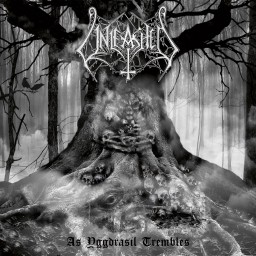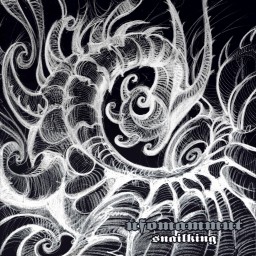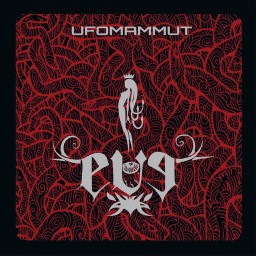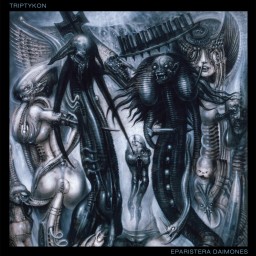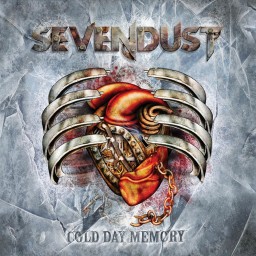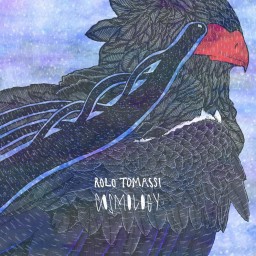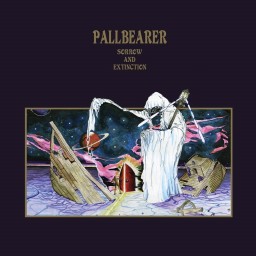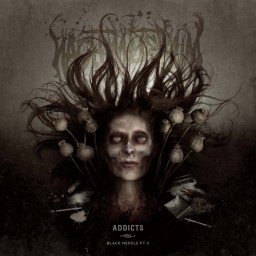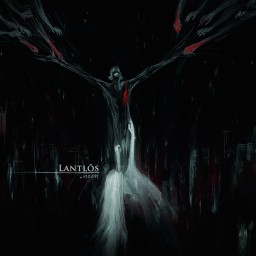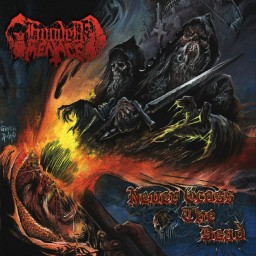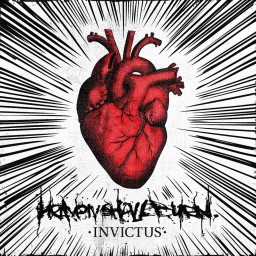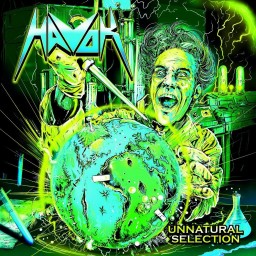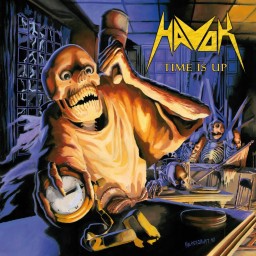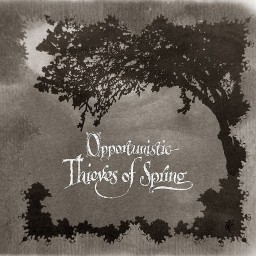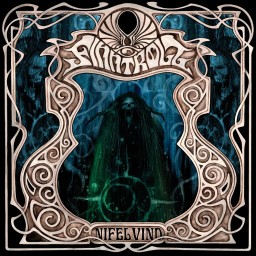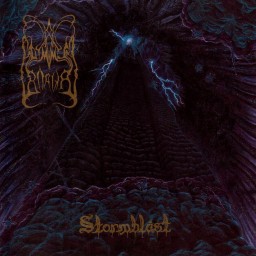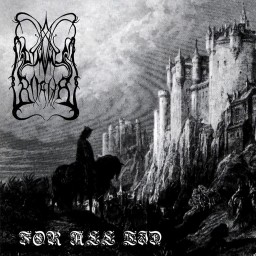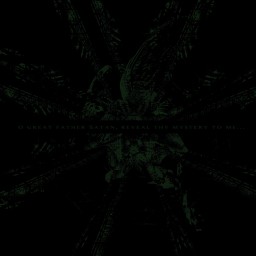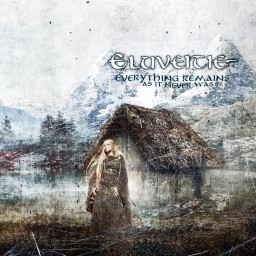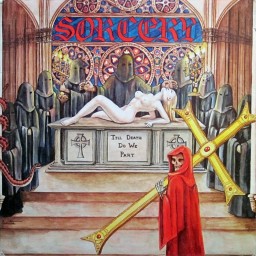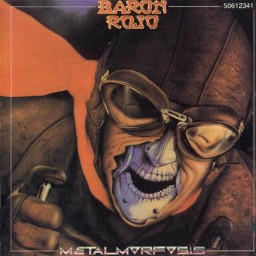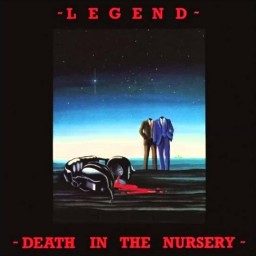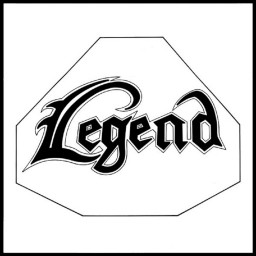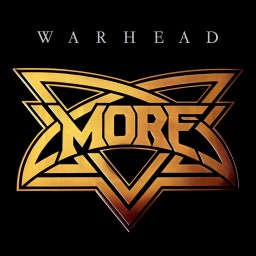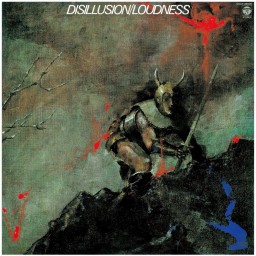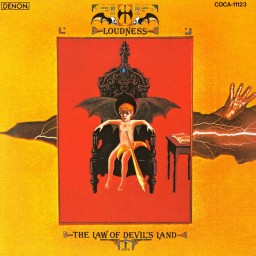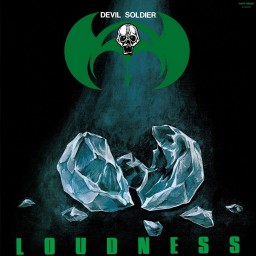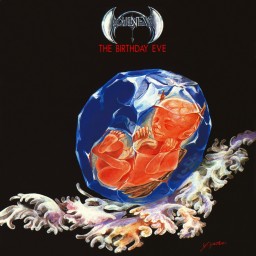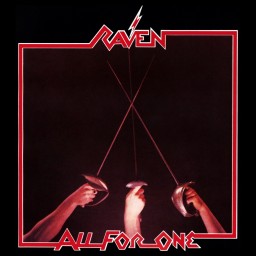Daniel's Reviews
Diamond Head's classic NWOBHM debut album "Lightning To The Nations" made a very big impression on me back in the day. So much so in fact, that I'd comfortably nominate it as the best metal album of 1980 ahead of some very strong competition which is quite an achievement for a release that was only ever intended to be the demo that would score the band a decent record deal. And it was successful in that endeavor too with major label MCA picking them up in 1981; a deal which saw Diamond Head recording their “debut" album “Borrowed Time” with producer Mike Hedges who had previously worked with the likes of The Cure & Bauhaus but had no real metal pedigree to speak of.
“Borrowed Time” certainly has a cleaner & fuller production job than “Lightning To The Nations” but it’s open for debate as to whether it suited the band’s sound better. Most people will tell you that it doesn’t & I have to say that I sit pretty comfortably in that camp too. It’s pretty easy to compare the two production jobs because “Borrowed Time” includes re-recorded versions of two of the songs from “Lightning To The Nations” in the title track & the classic “Am I Evil?”; neither of which are as good as the originals. “Lightning To The Nations” isn’t far behind the original to be fair however “Am I Evil?” has been performed at a slower pace & with less energy than the original. Plus, the production makes the riffs sound a bit muddy so even though it’s still amongst the album highlights it’s definitely a step down from the original version.
But the production isn’t the only thing that’s vastly different from the band’s previous studio offerings. Diamond Head are also championing a new style on the five new songs on offer. In fact, the two re-recordings are the only genuine metal songs on the album with the rest sitting more comfortably in the hard rock camp or somewhere in between. The new material is much less riff-oriented & also less obvious than the exciting metal of “Lightning To The Nations” so it requires a fair bit more time to get into. The urgency that was so potent on earlier releases isn’t there any more & it’s a moodier sounding Diamond Head in general.
Many fans & critics will tell you that this change in style can be put down to record label pressure however I’m not so sure as there’s really only one song that has a particularly commercial edge to it. Three of the songs clock in between six & eight minutes in duration & there’s a distinctly progressive edge to some of the material; particularly with the lengthier tracks on the B side which I would genuinely label as progressive rock. The single “Call Me” was clearly written with commercial success in mind though as it’s a fair bit poppier than anything we’ve heard from the band previously & although the chorus is pretty catchy it struggles to maintain my interest.
Brian Tatler’s lead guitar playing is the clear highlight of the record & I really enjoy the more progressive & bluesy moments where he’s given the space to stretch out a bit. I think vocalist Sean Harris has to try pretty hard to keep some of this material interesting because he’s not working with the sort of hooks he’s accustomed to but he does a pretty good job of it to be honest.
While “Borrowed Time” is comfortably regarded as Diamond Head’s second best release, it’s not considered to be essential NWOBHM listening. I think that’s a fair call but I do quite like it. It’s a very consistent record with just the one short blemish & I really enjoy listening to these four musicians as they generally always championed creativity & musicality over accessibility. If you’re a fan of Diamond Head’s early material then I’d recommend that you give this one a good four or five listens with an open mind to give it a chance to open up.
Genres: Heavy Metal
Format: Album
Year: 1982
May my sword of valour gloriously slay this source of such insidious dragon shit & may thee be forever banished unto the wasteland from whence thee came.
Genres: Folk Metal Symphonic Metal
Format: Album
Year: 2010
1982's “Soviet Invasion!” E.P. from legendary NWOBHM doom merchants Witchfinder General had served as a welcome introduction to the lumbering beast that is the doom metal subgenre. However it was their “Death Penalty” album from later that year that saw the band making more substantial waves with underground metal fans the world over. It was a record that wasn't quite doomy enough to qualify as legitimate doom metal in my opinion, despite it’s strong following & reputation. Whilst I don't consider "Death Penalty" to be the classic release that it’s so often reported to be, I’ve always had some time for it; despite the fact that it was clearly more of a tribute to Black Sabbath than anything more significant or ground-breaking. So it remained to be seen whether Witchfinder General would be able to build on their early success by taking a more artistic view point & creating a sound of their own with subsequent releases.
Well, we wouldn’t have to wait long to find out as Witchfinder General’s sophomore effort “Friends Of Hell” would be released a year later in 1983. This time with a fuller lineup featuring an actual bass player rather than the imaginary one we heard on “Death Penalty” where guitarist Phil Cope filled that role under the name Wolfy Trope. Rod Hawkes was the name of the new recruit & I’m pleased to say that “Friends Of Hell” doesn’t suffer from the same production problems as “Death Penalty” where the bass was much too far back in the mix. This time the production has a decidedly more polished feel to it in general with every instrument sounding more vibrant & a little cleaner. The guitars in particular are no longer simply trying to replicate the Tony Iommi crunch & are a little less dirty here while vocalist Zeeb Parkes sounds significantly more professional too.
But it’s not just the production that’s improved. The band members musical abilities seem to have benefitted from another year of steady gigging with Zeeb’s performance being noticeably slicker & Phil Cope’s guitar solos achieving a significant jump in technical proficiency. The jerky transitions & cut-&-paste composition of “Death Penalty” have been improved upon here too. Musically, Witchfinder General haven’t tried to reinvent the wheel here as they still seem very committed to recreating the 70’s Black Sabbath sound however there are some note-worthy elements to the “Friends Of Hell” record that warrant discussion. Firstly, I’d suggest that even though it may not sound as heavy as “Death Penalty”, “Friends Of Hell” showcases a fair bit more of the traditional doom metal sound than it’s older brother. In fact, unlike “Death Penalty”, I’d go so far as to say that “Friends Of Hell” does enough in this area to be labelled as an actual doom metal record. But what it also does is explore some more commercially accessible ideas which kinda cancel out the effect to an extent.
The almost disco feel & ridiculously dumb lyrics of the single “Music” & the weak & soppy love ballad “I Lost You” really get on my nerves & unfortunately the stronger tracks just aren’t strong enough to cover my disappointment. Of the eight tracks on offer here I only find myself to be fully engaged during three & none of them blow me away to be honest. You can hear the band attempting to implement more expansive arrangements on some tracks with additional instrumentation thrown into the mix here & there but the more groovy stoner feel to some of the material has never been something I’ve had much love for.
As a result, I’ve always found “Friends Of Hell” to be an overrated & disappointing release that does nothing to enlighten me as to why Witchfinder General seem to be held in such high esteem by doom tragics the world over. They may well have been amongst the earliest exponents of this sound but I simply can’t justify the heavy praise they receive because there were so many bands that did this sound much better; albeit a little later in the game. Sadly, Witchfinder General called it quits the following year in 1984 although there was a brief & fairly unsuccessful reformation attempt made without the involvement of vocalist Zeeb Parkes in 2007 which resulted in a disappointing third studio album in 2008.
Despite being generally well received by fans, I'd recommend that you give "Friends Of Hell" a miss & go straight for the more highly celebrated "Death Penalty" record which will almost certainly make a better account of itself.
Genres: Doom Metal Heavy Metal
Format: Album
Year: 1983
Amazingly, by 1982 the metal world was still yet to experience a release that genuinely defined a new subgenre in the same way that Black Sabbath's self-titled debut did when Tony Iommi first hit those three epic downstrokes notes way back in 1970. To put that into perspective, that means that the first twelve years of metal had passed by without anyone really pushing the sound into places that it hadn’t already gone before. But that was about to change, & things would gradually start to escalate over the next few years too.
To go into more detail, Black Sabbath may have defined the heavy metal sound through songs like “Black Sabbath” & “N.I.B.”, but they also hinted at an even darker & gloomier sound at times without ever really embracing it for more than a couple of songs here & there. I think it would be fair to say that Sabbath were an artistically expansive & quite an ambitious band & that’s why they were so instrumental in the formation of so many of the subsequent metal subgenres, but they never spent too long sitting on their laurels. Later in the mid-70’s, bands like Pentagram & Bedemon would take that doomier sound & expand it into something more targeted, but neither managed to get their shit together for long enough to enable them to release that seminal record that would put this new sound (known as doom metal) on the map. That honour would have to wait until 1982 when a young four-piece NWOBHM band from Stourbridge in West Midlands, England put out their debut single entitled “Soviet Invasion!”.
Witchfinder General's first-up three-song affair featured two studio recordings in the title track & “Rabies” as well as a live recording of a song called “RIP”. It was a fairly low budget effort but all of the elements of what we now expect from the traditional doom metal sound were there nonetheless: the monotonous & heavy playing style of early Black Sabbath, the deathly slow tempos, the repetitive & sometimes atonal guitar riffs, the “rocking to sleep” bass lines, the blues rock & psychedelic rock influences, the cold & grief-stricken vocal approach & the dark & depressing lyrical content. All of these factors contributed to the birth of a new concept in metal & one that would change fairly minimally over the years but would build a legion of devoted followers who craved ever more destitute & down-trodden hymns for the damned. But that wasn’t to say that Witchfinder General had stumbled across an all-time classic release here. It was certainly ground-breaking from a conceptual point of view but I wouldn’t say that it was particularly note-worthy from a quality one.
The title track is comfortably the best of the three songs included. It begins with a lovely sweet acoustic guitar section that lulls the listener into a false sense of security before the impending arrival of the crushingly heavy down-tuned guitar riff onslaught of Phil Cope. Phil’s riffs really do sound extremely heavy for the time. He’s managed to tap into Tony Iommi’s riff library & stole what could only be described as some of Tony’s most disconsolate work. There’s nothing bright or uplifting about the guitar sound either. It sounds genuinely depressing but not in a bad way. For this is a point worth noting about doom metal in general. Its fans seem to take solace & a general feeling of empowerment from all of the negativity presented to them. It’s a difficult thing to explain to those that aren’t already onboard with it but doom metal possesses the timeless ability to impose a feeling of unity on the listener. It’s almost like we feel better about our own lives because we’re presented with solid evidence that others experience the same sort of dark feelings that we do on occasion & this can in turn lead to an uplifting feeling that can be quite addictive.
Each of the songs on “Soviet Invasion!” speeds up a little for short changeup sections that both draw the audience into live performances & also work to further enhance the heaviness of the slower material when it returns a short time later. The vocals of Zeeb Parkes are clean & quite serviceable without being particularly engaging while the bass lines generally double the guitars & add some nice little melodies here & there despite the fact that there's very little energy to them. They tend to lead the listener into a comfortable sway that has a somewhat psychedelic effect & that’s not uncommon for doom metal in general. Especially the more traditional 80’s style. The drumming is also fairly laid back here though which is not always the case with doom. I would definitely have preferred to hear the drummer really savaging his kit but he seems to be sitting back in his comfort zone here to an extent. Particularly on the live cut. It doesn’t contribute to a heavier sound which is a shame & I think this is the element that prevents me from really getting into this release as much as I feel I should. This is hardly a precision performance either with the three instrumentalists seeming to struggle to stay in time quite often.
Witchfinder General certainly hint at a sound that would appeal to me on a deeper level but overall this E.P. seems to sound a little bit casual to my ears & I think it’s the drumming that’s the major factor in that. Doom metal fans will want to hear this single at some point but I wouldn’t say that it’s particularly essential & younger doom metal fans might be best served by checking out Witchfinder General's debut full-length "Death Penalty" before deciding that the band are none of their business. "Soviet Invasion!" is more of a seminal release than it is a high quality one in my opinion.
Genres: Doom Metal Heavy Metal
Format: EP
Year: 1982
Their 1982 self-titled debut album was a far cry from Virgin Steele’s glory days of the mid-90s. The production was absolutely atrocious & the song-writing showcased a band that was still very much finding their sound. It did however hint at a more orchestral & symphonic style of epic metal than we’d heard to that time so you may be interested to see where the band would take that on their follow-up record which was released just six months later with the same lineup.
1983’s “Guardian Of The Flame” album sees Virgin Steele only marginally improving on the woeful production of the debut with their sophomore effort sounding very thin due to a distinct lack of rhythm guitars & overall bass in the mix. It’s a very wishy washy sound to be honest & I’ve got absolutely no idea how anyone with working ears could have thought they were on the right track during the mixing process. The rhythm guitars really are about half the volume they need to be & it sucks all of the heaviness out of these songs which is a real shame because this is some much stronger material.
Guitarist Jack Starr has toned down his tendency to continually throw guitar solos around on the debut & this sees the songs having a little more room to breathe. He still goes to town when given the opportunity though & his solos are certainly shredding, if not particularly precise. The rhythm section keeps things fairly simple which puts a lot of pressure on front man David DeFeis to deliver given the lack of guitars. He’s really improved his delivery in the six months since Virgin Steele’s first effort though & puts in a much more polished & mature performance. In fact, the stronger pieces definitely line up with the moments where David gets it right as far as the vocal hooks go.
Virgin Steele’s sound is decidedly more metal than before with much less progressive rock & a bit less hard rock influence. The basis of their sound still sits with the classic heavy metal bands of the 70’s & early 80’s although they’ve retained the more symphonic elements that were hinted at previously with Rainbow’s “Rising” album once again proving to be a major influence. This is mainly evident on the more epic & lengthy songs which lean further towards the US power metal sound that was starting to be developed. There are 3 or 4 really good anthemic heavy metal songs here & it’s a real shame that the production puts a cap on how far they can dig their teeth in but you can comfortably discern that Virgin Steele have some real potential. Unfortunately the B side isn’t as strong as the A side & the last couple of tracks in particular really do their best to taint the impact of the stronger material. The closing number stands out as the only real shocker on the record though. It’s a terribly cheesy ballad which leaves me sporting a particularly bad taste in my mouth.
Overall, I’d suggest that you give “Guardians Of The Flame” a miss & check out Virgin Steele’s more classic material. It’s limited payoff isn’t worth the effort it will take you to get into it.
Genres: Heavy Metal
Format: Album
Year: 1983
New York heavy metal legends Virgin Steele began life as a four-piece back in 1981 & unbelievably started recording their debut album just three weeks later. The self-titled release finally saw the light of day late the following year in December 1982 & it didn’t exactly set the world on fire to be fair. For starters, the production is absolutely dreadful (even for the time) so one would assume that this was a self-financed & produced effort. In fact, it sounds very much like it was recorded live as the rough edges haven’t been smoothed out & are all still very obvious (if not intrusive). Also, much like Manowar's "Battle Hymns" debut, the album showcases a band that was very much still finding their sound with an array of different styles on offer across the tracklisting. There are a few tracks that present the bombastic style of heavy metal that Virgin Steele would later become known for but they’re surrounded by material that could only be described as generic 70’s inspired hard rock. I mean, as with many heavy metal releases of the NWOBHM era, there’s just as much hard rock here as there is legitimate heavy metal with 70’s hard rock bands like Led Zeppelin, Deep Purple, Queen, UFO, Rush, Van Halen & particularly Rainbow all having a hand in Virgin Steele’s sound. On the other side of the equation there’s a lot of 70’s Judas Priest here too along with elements of the more modern early 80’s Ozzy Osbourne metal sound.
A combination of those influences Virgin Steele may be but it’d be remiss of me not to draw your attention to the fact that early Virgin Steele also offers the listener an additional element; a unique identifier that set them apart from the rest of the field. Even at this very early stage we see them regularly employing elements of classical music to give their sound more of an epic orchestral feel. I’d suggest that this more pompous & theatrical style was influenced by bands like Queen & Rainbow however Virgin Steele present their melodies & orchestration a bit differently; often hinting at a medieval sound. It’s certainly pretty cheesy at times with more than a whiff of power metal about it & the higher register vocals of David Defeis do nothing to alleviate my concerns but this album really is all about the solos with guitar shredder Jack Starr showing off his Eddie Van Halen & Randy Rhoads influenced chops at every opportunity. Jack employs a similar approach to Randy in that he colours the riffs with improvised lead work & very rarely sits still. To be honest though the production is that poor & the song-writing so substandard that it makes very little difference to my overall enjoyment of the record. In fact, the only track that I legitimately enjoy is an Eddie Van Halen “Eruption”-inspired unaccompanied guitar wank piece entitled “Pulverizer” which doesn’t say much for the rest of the material. There are a couple of real shockers here too.
Personally I find “Virgin Steele” to be pretty lackluster overall but it was always unlikely to appeal to my tastes. If you like the sound of 70’s-hard-rock-inspired heavy metal like Japan’s Loudness crossed with the epic cheesiness of Sweden’s Heavy Load & the more expansive & fantasy-fueled arrangements of classic Rainbow then you may feel differently.
Genres: Heavy Metal
Format: Album
Year: 1982
The unusually named Picture formed as a four-piece in Rozenberg in 1979 & released their debut self-titled album the following year. It suffered from poor production & was more of a straight up hard rock record so it slipped by the metal media without much fanfare. 1981’s follow-up record “Heavy Metal Ears” was more of a legitimate heavy metal release; probably the very first to come from the Netherlands in fact. The music was a step up in quality from the debut however Picture still hadn’t got the production right & once again the album failed to have the impact that the band & their management were hoping for (despite being a generally pretty enjoyable listen in my opinion). During this time Picture were building a strong following through their solid live performances with several high quality support slots across Europe but it wasn’t until they recruited Israeli vocalist Shmoulik Avigal that things really started to come together for the band with Picture’s third album “Diamond Dreamer” being the record that would see Picture finally managing to achieve the studio production they deserved & fulfillling the promise they’d shown since their early days.
Musically, Picture keep things pretty simple on "Diamond Dreamer". They stay predominantly within their comfort zones by laying down tight, high-quality 70’s-inspired hard rock & heavy metal grooves. The metal outweighs the rock considerably on this occasion however if I had to guess as to Picture’s influences I’d probably point at more hard rock-driven 70’s outfits like Deep Purple, Whitesnake or Rainbow. But the band presents those influences in a more modern 80’s metal package that should appeal to fans of Accept, Saxon, Dio & late 70’s Judas Priest.
There’s nothing flashy on display here. It’s a workman-like performance from a band that had paid their dues over the previous three years but Picture’s real strength comes in the remarkable vocal abilities of their front man. Avigal’s performance is nothing short of brilliant in my opinion. His voice is so strong that he’s able to lift some of the less impressive vocal hooks to much higher levels. Think the hard rock power of Whitesnake’s David Coverdale meets the soaring operatics of Ronnie James Dio & you won’t be far off the mark. I just love his sound. Some of the lyrics do tend to be a bit basic & cheesy but I can easily look past that as the vocal hooks are infectious. I’m genuinely amazed that “Diamond Dreamer” didn’t make any sort of dent on the early 80’s metal scene & it’s really unfortunate that this would be Avigal’s only release for Picture as he was unceremoniously axed from the band after a petty argument with Picture’s manager a short time afterwards. Out of interest, he would later go on to record an album with US heavy metallers The Rods.
I consider “Diamond Dreamer” to be somewhat of an undiscovered gem. In fact, I actually rate it more highly than many of the more widely celebrated metal albums of 1982 so if the influences listed above mean anything to you at all then I'd strongly urge you to give "Diamond Dreamer" a good few spins to give it a chance to fully dig its teeth in. You won't regret it.
Genres: Heavy Metal
Format: Album
Year: 1982
The early French metal scene was a little slow to get off the mark in comparison to their competition in the NWOBHM. In fact, we really didn't see any genuinely heavy releases of any note coming out of France during the first decade of the metal journey & 1980 didn't offer a whole lot more with only the very popular Trust pushing a sound that touched on the heavy metal model. However 1981 would see some competition finally starting to take shape in the self-titled debut album from a five-piece outfit from gay Paris going by the name of Warning (not to be confused with the avant-garde German doom metal band Warning that released their own self-titled album in 1982 just to make things confusing). "Warning" was a more than decent hard rock record but there was little sign of any legitimate heavy metal on there to tell you the truth. We'd have to wait for the 1982 follow-up release "Warning II" to hear anything close to that (well actually it's also called "Warning" but let's go with "Warning II" to avoid even more confusion).
Now if we're working to the letter of the law, then it's definitely more accurate to say that "Warning II" showcased a brand of heavy music that still sat more comfortably under the hard rock banner than the heavy metal one overall with the influence of bands like AC/DC, Van Halen & Def Leppard all jumping out pretty obviously. But there's still just enough genuine metal on offer on to satisfy all you metalheads out there & it's of a pretty high quality too with Judas Priest & Riot seeming to be the main influences if my ears don't deceive me. Warning were an extremely talented bunch of musicians & I’d be very surprised if they weren’t seasoned veterans of the scene by this stage in their careers because these songs are beautifully performed & constructed. The guitar solos in particular are quite breath-taking & lead shredder Christophe Aubert possesses some serious chops to burn. Do I even hear some sweep picking at one point which would be more than a year before legendary Swedish shred virtuoso Yngwie Malmsteen brought this technique to global infamy? Vocalist Raphael Garrido has an extremely bad-assed style of vocal delivery that I really enjoy too. It makes the French lyrics sound so much more palatable to an English speaking listener like myself. I’d suggest that his sound falls somewhere between Accept’s Udo Dirkschneider & Megadeth’s Dave Mustaine with a bit Judas Priest’s Rob Halford in his upper register screams. Now that might sound horrible to some people but give him a chance because this guy is pure rock ‘n’ roll.
The production job on “Warning II” is very good with the production team favouring more of a hard rock sound than a metal one. The bass guitar could be a little louder in the mix but it’s not a major concern.
The tracklisting is particularly consistent overall with just the one track falling into the filler category however there aren’t really all that many highlight songs which is what has possibly prevented “Warning II” from a greater level of success. I still quite like it though & to be honest these first couple of Warning albums mark the earliest foreign language metal releases that I find much enjoyment in. I probably prefer the follow-up just slightly over the debut but I'd recommend that you give them both a spin if you're partial to well composed & executed heavy rock.
Genres: Heavy Metal
Format: Album
Year: 1982
Some pretty generic black metal that lacks the sophistication & technical prowess of the top tier bands. The vocals are pretty decent in the style of Satyricon. The production is very nice too. There are some good sections of powerful black metal that unfortunately don't hold out for a full track. The simple, boring old school thrash/punk riffs show their heads just when you think you're getting into it. The lead guitars are very average & don't suit the bands sound at all. See the outro of "Waters Of Ain" for a prime example as it sounds like the end of an Eric Clapton track. Bonus track Chains Of Death is especially poor & should not have been included.
Genres: Black Metal
Format: Album
Year: 2010
I find this album to be fairly generic with a very strong Meshuggah influence. The musicianship is excellent but I just can't get into it.
Genres: Metalcore Progressive Metal
Format: Album
Year: 2010
I've never been a huge fan of Unleashed. I've always found them to be a bit simple & every album was basically the exact same formula. So no surprises that "As Yggdrasil Trembles" follows the same trend. You'll hear the same simple (but effective) old-school death metal riffs with the trademark death growls that are unusually intelligible for a death metal vocalist. The lyrics are far too childish for an older metalhead like myself to take seriously & I think Unleashed could certainly spend a bit more time on that aspect of their next release. I must say that (even though they are overly long at times) the guitar solos are really great. I found myself waiting to hear them each song. This is a solid release that won't win any new fans but won't lose them many either.
Genres: Death Metal
Format: Album
Year: 2010
This is a big improvement on the band's previous "Godlike Snake" release in my opinion. "Snailking" sees Italy's Ufomammut bump up the psychadelia & doom a couple of notches & tone down the stoner rock. These can only be great things as far as I'm concerned. This results in an album that's heavy as hell & dirty as shit. It's like a huge lumbering beast that's tripping out after eating some dodgy mushrooms. I love how the vocals take a backseat to the huge Sabbathy riff carnage. A really fun record.
Genres: Doom Metal Sludge Metal Stoner Metal
Format: Album
Year: 2004
I was floored by the quality of this album. It came outta nowhere! A combination of crushing Black Sabbath style doom metal & drug-fuelled psychadelic rock, "Eve" is not intended to be listened to as individual tracks. It must be experienced as a whole. This is indicated strongly by the lack of song-titles & the way the tracks flow from one to another.
The opening & closing tracks are epic 13min+ builders that start deeply atmospheric & finish in chaotic walls of sound. The noisy distorted bass guitar leads from the front & vocals are left to an absolute minimum. In fact, the vocals are rare & are more for background colouring than for anything else. This is very cerebral music that I wouldn't recommend for celebratory parties. It's prime time stoner material for a dark room with just some trippy visuals on the TV. Highly recommended!
Genres: Doom Metal Sludge Metal
Format: Album
Year: 2010
Being an old Hellhammer/Celtic Frost fan, I was pretty excited to hear what this release was like & I haven't been disappointed. This CD is full of the crushing Sabbath-style riffs that I loved 30 years ago recorded with a greatly increased level of production. Tom sounds as angry as ever as he spits out his lyrics over an imposing wall of sound. Last track "The Prolonging" in particular is absolutely epic and is a clear highlight. Atmospheric interludes are used to break up the heavier moments and create a nice contrast. Unfortunately, most of the more up-tempo moments on the album are a bit of a let-down. "A Thousand Lies" sounds like a poor man's version of early Bathory & the outro to "Descendant" is a straight rip-off of the King/Hannemann solo section in Slayer's "Angel Of Death". However it is worth noting that this album is a bit of a grower with each listen opening up new surprises so I wouldn't be surprised if I end up bumping up my rating a little later on down the track.
Genres: Doom Metal
Format: Album
Year: 2010
"Cold Day Memory" is a very solid (although highly predictable) collection of radio metal anthems that oozes class but ultimately proves to be fairly formulaic. The production is immaculate as you might expect from a major label heavyweight act such as Sevendust & all of the instrumentalists put in fine performances. The guitar sound is very chunky & I was particularly impressed by how the drums & bass work so tightly in unison to create a rhythm section in the truest sense of the term. There are also no soppy ballads like you usually hear on these sort of releases which was certainly a pleasant surprise.
Vocalist Lajon Witherspoon can really sing & the vocal hooks come at you thick & fast from the first track. In fact, my major gripe with "Cold Day Memory" is probably it's biggest drawcard. Every track has a big radio-friendly chorus that just sounds too commercial for someone who despises radio playlists like I do. I must admit that the tracks tend to be difficult to tell apart after a while because they re all based on the same concept of making a big radio rock/metal anthem. Sevendust certainly succeed in this quest & tracks like "Karma" (my clear personal favourite) have some great song-along potential.
Overall, I couldn't help but enjoy "Cold Day Memory" even though I did a cringe on occasions. Sevendust just do this stuff so well that you have to admire them for it. This album won't change your life but it could brighten your day.
Genres: Alternative Metal
Format: Album
Year: 2010
"Cosmology" is essentially some very messy sounding mathcore that lacks the songwriting, production & melody of class acts like the Dillinger Escape Plan. I found it to be quite a grating & uneasy listening experience. The screaming vocals are very ordinary. I think Rolo need to concentrate more on writing catchy riffs than being clever & chaotic all the time. It just doesn't work as listenable music.
Genres: Metalcore
Format: Album
Year: 2010
This is the debut album from these US Sabbath worshippers. I usually love this style of traditional doom metal & this record is not bad at all but the production unfortunately lets it down a bit as it's quite muddy & lacks brightness. Also, the musicianship is not terribly wonderful. The guitars are not perfectly in tune at times (especially in the opening track). The vocals are in the Ozzy Osbourne/Warning style & I quite like them most of the time. They're a bit further back in the mix than you would expect but that's not such a bad thing as it adds emphasis to the riffs which should definitely be the focus here. You can expect plenty of those beautiful early Cathedral-style guitar harmonies here which is always a good thing. Overall, "Sorrow & Extinction" is certainly heavy & I think Pallbearer would be great live. If the result of this debut album is any indication then they can only improve from here.
Genres: Doom Metal
Format: Album
Year: 2012
Well this is certainly a bit different. I'd say it's Darkthrone-style black metal mixed with classic rock influences. I can't say I'm a big fan. The musicianship isn't exactly inspiring with the guitar solos being particularly ordinary. The rock influence is very obvious in the song structures as the band tries to write sing-along choruses for black metal which seems like a lost cause in my opinion. But at least they're trying something different. There are some nice moments where they leave the weird shit to the side & just concentrate on the pure black metal. But overall this isn't really my bag.
Genres: Black Metal
Format: Album
Year: 2010
This is a really great album. The German's had a really solid year when it came to black metal & I find this release to have a freshness & originality that took me by surprise. The jazz interludes are nice & the shoegaze influence works particularly well. The extra melodic element is still quite deep & keeps me interested throughout. The faster drumming sections could with a bit of tightening up & the production is not brilliant but that doesn't take away from the overall atmosphere. Closer "Neon" is the highlight. It would be interesting to see what Lantlos could do with a bigger production. This was definitely amongst the best black metal album I heard in 2010.
Genres: Black Metal Post-Metal
Format: Album
Year: 2010
Some really chunky doom death metal with obvious early Cathedral influences. The guitar sound is heavily down-tuned & sludgy. Vocalist Lasse's Cookie Monster vocals are pretty unconvincing & the overall sound is a bit primitive. There are some really heavy chugging moments spoiled by some really bad groovy ones. The guitar solos are particularly average. This whole CD sounds a bit dated in today's environment.
Genres: Doom Metal
Format: Album
Year: 2010
There's some serious metal going on for most of this album & I quite like it. It's about time someone put out some melodic death metal with balls & the At The Gates influence is strong here. The vocals are the highlight as they are extremely powerful for the most part. I can excuse the occasional flourish of metalcore when there are such strong metal riffs on display. There are also no wanky guitar solos to be found. Even the weaker, more melodic sections only appear for short periods before being overtaken by something more substantial. Unfortunately the last few tracks are very disappointing, especially "Of Forsaken Poets" which is just plain terrible. But overall this is worth a good listen or two.
Genres: Death Metal Metalcore
Format: Album
Year: 2010
These guys play an undeniably 1980's style of thrash metal. This one's a bit more mid-paced than I remember 2011's more energetic "Time Is Up" album to be. The production & musicianship are excellent here. The bass sound & performance stands out in particular & the guitar solos sound vibrant & fresh. Unfortunately (as I find with most modern thrash metal) the songs just aren't there. Plus there's little to no originality so you could easily be listening to the latest Exodus or Overkill records. Not a bad record if you like that kind of thing but I got bored pretty quickly.
Genres: Thrash Metal
Format: Album
Year: 2013
More very well written & executed but thoroughly uninteresting US thrash metal. I've got some shocking news for you people. The "thrash metal revival" is a myth. For a revival to actually take place there has to be bands that are taking the genre forward. If Havok's "Time Is Up" is the best that's out there then I remain unconvinced. This is basically an Exodus tribute album. There is plenty of energy & some good production & musicianship but ultimately I've heard it all done before a thousand times. I have nothing against Havok who are doing what they love & do it very well but I can't rate an album like this higher than three stars. It may be the best of the current pack but I still find I would rather be listening to "Bonded By Blood". Oh ...and for the record gang vocals don't cut it in modern times.
Genres: Thrash Metal
Format: Album
Year: 2011
I'm not really sure what to make of A Forest Of Stars. They're quite different to your average black metal band in that they incorporate a lot of alternative instruments. However they just don't really pull it off all that effectively. The vocals are disappointing. Some of the ambient interludes are nice. I find the drumming to be a bit sloppy during the faster sections. There is some atmosphere but the whole experience is a bit wishy washy & I can't really get into it much. It seems to lack some focus.
Genres: Black Metal
Format: Album
Year: 2010
Neck & neck with the new Sigh for CD for worst metal release of 2010. These guys should stand trial for unforgivable crimes against metal.
Genres: Folk Metal
Format: Album
Year: 2010
After being totally underwhelmed by Dimmu Borgir's "For All Tid" debut, I decided to give their second album "Stormblast" the benefit of the doubt & therefore went in with an open mind. Although I find it to be a big improvement on "For All Tid", I am still a long way from really enjoying it. The production is still pretty poor even though it's undoubtedly better than their debut. The drum sound is particularly average & the guitars need much more depth (& probably more overdubs). Also, I'm afraid that there is just not much of a dark atmosphere or any form of aggression. It all just seems to float along in a very unintimidating fashion with the keyboards taking most of the focus. What they need are some riffs with real excitement in them. "Stormblast" doesn't appeal to my tastes so I pretty quickly find myself bored.
Genres: Black Metal
Format: Album
Year: 1996
I remember hearing this album when it was originally released in 1994 & I didn't like it much. For some reason, I thought I'd give it another listen & have found that I like it even less if anything. There is simply nothing good about it. The production is woeful. The thin, fuzzy guitars are unacceptably far back in the mix & the vocals too far forward. There is no high end in the mix much at all really. The performances are terrible (especially the drumming which is constantly out of time) & the song-writing is very amateurish indeed. The clean vocal sections must be a joke of some sort. The attempts at atmosphere are laughable. It's amazing that Dimmu Borgir managed to go on to bigger & better things after this abortion of a debut.
Genres: Black Metal
Format: Album
Year: 1995
Abigor - Time Is the Sulphur in the Veins of the Saint - An Excursion on Satan's Fragmenting Principle (2010)
Could Abigor be thumbing their noses at their label with this release? Otherwise I have absolutely no idea what they thought they were doing. You know those hilarious occasions when some unfortunate soul leaves themselves logged on to a chatroom or forum, gets drunk & passes out & then wakes to find that his mates have posted something hilarious under their alias? Well this sounds like Abigor got drunk, passed out & woke to find that their pissed mates had recorded some absolute rubbish in their studio & released it under their name. That can be the only explanation really. I gonna go with that. Complete nonsense!
Genres: Avant-Garde Metal Black Metal
Format: Album
Year: 2010
I am a very long way from understanding the attraction to this style of music. It sounds like a bad joke to me. I would hate to think that people thought this was what I'm into when I tell them I like death metal.
Genres: Death Metal Folk Metal
Format: Album
Year: 2010
I wasn't much of a fan of the 1978 debut album from Chicago heavy metallers Sorcery to be honest. "Sinister Soldiers" is often referred to as an early example of the US proto-doom movement however I feel that it would be much more accurate to say that it was essentially a 70's hard rock record that's been diluted with various different influences in a noticeably haphazard fashion. So I wasn't too disheartened to read that Sorcery had gone into the recording of their 1980 sophomore album with a fresh new lineup.
New vocalist Jim Kelly is a welcome addition to the band & his vocals are the clear highlight of the album for mine. He sounds a lot like Rob Tyner from MC5 or John Garcia from Kyuss here as he has this cool American drawl thing going on, but unfortunately his performance often loses some of its impact due to the poor production work around him.
"Till Death Do Us Part" doesn't see Sorcery flirting with doom, punk or psychedelic influences in the same way that they did on the debut. This time around we get a sound that sits somewhere between the heavy metal of Black Sabbath & the hard rock of Alice Cooper with some quite abstract & progressive instrumentation & arrangements being employed across the tracklisting. Sorcery were being a little too ambitious for their own good here in my opinion as there are far more misses than hits, leaving us with a fairly unfocused record that sounds like the result of a union between a band & producer that didn’t really know what they were trying to achieve as a creative unit. Just check out the bizarre piano parts for example as they're particularly strange.
Overall, I probably had a little more time for "Sinister Soldiers" than I do for "Till Death Do Us Part" which isn't very encouraging. It's once again filled with some interesting ideas that required much more skill than the band possessed in order to be molded into a final product that makes sense as an album. I guess Sorcery just never really hit the spot for me.
Genres: Heavy Metal
Format: Album
Year: 1980
Baron Rojo’s second album “Volumen brutal” was not only the first noteworthy metal release to come from the Spaniards but it would go on to become the most celebrated & important Spanish metal record in history. Unfortunately though, that particular release & I have never seen eye to eye really. The production & musicianship are excellent however I struggle with the Spanish language vocals & the song-writing in general. Also, despite its reputation & image, I find it to sit much more comfortably under the hard rock banner than I do the heavy metal one. So the question is… will their follow-up album see me changing my tune or will it be more of the same?
Well the answer isn’t all that straight forward. The first thing you’ll notice about 1983’s amusingly titled “Metalmorfosis” album is the production. It’s decidedly average compared to that of its predecessor with a generally muffled feel to it. It’s blaringly obvious if you listen to the record back to back with other music & it takes some getting used to. Thankfully it’s not a deal-breaker for me & I’m able to cope with it even though it’s a little bit disappointing.
The vocals on “Metalmorfosis” take a very similar approach to those on “Volumen brutal” & I find front man Carlos de Castro’s delivery to be no more easily palatable than I did previously but the big difference here is in the quality of the song-writing. It’s clearly stronger than before in my opinion & this provides me with so much more to dig my teeth into than I found on “Volumen brutal”. Don’t get me wrong. I’m still not suggesting that this is a genuine metal release. Although it’s generally regarded as such I don’t hear much metal here in a good two thirds of the tracklisting. It’s probably a little heavier than “Volumen brutal” overall which appeals to me but there’s much more Deep Purple, AC/DC & Scorpions on display here than there is Iron Maiden, Judas Priest or Black Sabbath. That’s not necessarily a bad thing though as I find plenty to like about these songs with a good two thirds of the tracklisting managing to dig their teeth right in. Even the few weaker numbers here aren’t all that bad with the musicianship once again being very strong & the de Castro brothers doing a great job at filling out the sound.
I have to say that I find it very strange that “Volumen brutal” is regarded as Baron Rojo’s piece-de-resistance instead of this one as it seems to take a comfortable step up from that release in my opinion. Perhaps it’s the weaker production & the fact that “Volumen brutal” was the first major metal related release to come out of Spain that’s enabled it to become so celebrated? Or it could also be the fact that they did an English version of that album with the assistance of Bruce Dickinson from Samson & Iron Maiden that’s made all the difference as I’ve never heard that “Metalmofosis” got the same treatment. But one thing I AM sure about is that you should check this record out because, despite the dodgy Spanish vocals, it’s got a lot to offer fans of heavy rock music.
Genres: Heavy Metal
Format: Album
Year: 1983
With the European metal scene starting to heat up in the early 1980's, it was only a matter of time until we’d start to see metal bands popping up from countries like Spain with this particular release representing not only the first metal-related release to come out of the country but also the most celebrated one still to this day.
Baron Rojo (which is Spanish for Red Baron) started as a four-piece hard rock outfit formed around the twin guitar attack of Armando & Carlos de Castro in Madrid in 1980. They released their debut album “Larga vida al Rock and Roll” the following year with reasonable success however it was Baron Rojo’s follow-up album “Volumen brutal” that saw the band toughening their sound up a little & also reaching a greater level of commercial & critical success. In fact, I’ve even read that Metallica drummer Lars Ulrich once placed “Volumen brutal” in his all-time top ten metal albums so they were really going great guns at this stage & as soon as the album first graces your ear drums it’s pretty clear that Baron Rojo were a class act. It’s also notable that on the original release of “Volumen brutal” all of vocalist Armando de Castro’’s lyrics were sung in Spanish which is clearly a career limiter however the band made the intelligent decision to release an English version ten months later in December 1982 & that was just the ticket to further enhance their sales figures with over two million copies of the album sold worldwide. Interestingly enough, the band engaged former Samson & new Iron Maiden vocalist Bruce Dickinson to assist them with the translations but the Spanish version is probably the more prominent of the two releases & the one that I’m most familiar with so that’s the version I’ve chosen to review here.
The production job on “Volumen brutal” is excellent & it presents a band that clearly know what they’re doing in the studio. The same can be said for the instrumentation & performances as all band members are right on top of their game. The twin guitar attack & the use of guitar harmonies is excellent throughout the album which is no surprise given that the two guitarists are brothers.
Now this might all sound pretty positive so far however I’m about to turn that around as I have a fairly big problem with “Volumen brutal” i.e. the vocals of Armando de Castro really annoy me. I don’t think that the Spanish language translates well with the band’s sound & it makes the vocal delivery sound a bit more cheesy & light-weight than it might otherwise have done. Plus, I don’t think that Armando was an amazing vocal talent anyway so when you throw in some fairly flat vocal hooks on some of these tracks you get an album that shows great instrumental promise but falls flat due to the lack of a quality vocal delivery. To be honest, Baron Rojo’s sound on "Volumen brutal" doesn’t seem particularly metal to me either. They seem to be more of a quality hard rock outfit with heavy metal elements to my ears. There’s really only one genuine metal song with another couple sitting somewhere between metal & hard rock in my opinion. I’d suggest that they were influenced by bands like AC/DC, Scorpions & Deep Purple with some NWOBHM influence thrown in there as well so they have a solid enough pedigree if not a particularly metal one.
The high praise that I see floating around on the internet would indicate that I might be on my own in not rating the album too highly but if you've read a reasonable number of my other reviews I’m sure that you’re already aware that I call ‘em like I see ‘em. I simply don't feel the urge to return to "Volumen brutal" & as a result it would hypocritical of me to recommend it.
Genres: Heavy Metal
Format: Album
Year: 1982
I quite liked the self-financed & self-titled debut album from Jersey-based NWOBHM band Legend. It’s unique blend of Black Sabbath influenced heavy metal, hard rock & progressive rock earnt the band a fair few spins on my car stereo recently. But Legend weren’t quite done yet as they quickly went about recording & releasing their sophomore album entitled “Death In The Nursery” the following year.
There are some noticeable differences between the two releases with the band’s sound offering more variety & showing a new-found maturity that wasn’t as evident on the debut. The strong Black Sabbath influence that played such a big part on Legend’s debut has been toned down substantially here with “Death In The Nursery” sporting a more melodic sound that sits somewhere between the heavy metal of Judas Priest & the progressive hard rock of Rush on this occasion. There’s still plenty of ambition shown in the arrangements & the musicianship showcases the class of the individual band members well here too.
Vocalist Mike Lezala’s clean vocal approach sounds better suited to this material as it’s not as dark & doomy & there are more up-tempo numbers. Mike’s also helped substantially by the increased emphasis on song-writing & accessibility in these arrangements which make his unintimidating delivery sound more fit for purpose than it appeared to be on “Legend”. I recently read that one of Legend’s original guitarists Marco Morosino had left in the time between the two records however I can’t say that I miss him because remaining guitarist Peter Haworth does a brilliant job without him. His solos are thoroughly engaging & he shows that he has some chops to burn at various stages across the tracklisting.
While the production is still quite raw due to the self-produced nature of the product, it’s by no means a sore point & is acceptable at worst. Legend have certainly learnt a few things since the debut in that regard but it’s still pretty easily to tell that this a self-produced effort.
Overall, I think “Death In The Nursery” is a bit of a step up from the debut & a bit of that comes with an increased maturity in the sound & song-writing. It’s a shame that Legend didn’t go on to bigger & better things because they were certainly capable of it. A record label budget & an experienced producer may have made all the difference & propelled Legend on to a much more fruitful career than they’ve had to date. As it stands, I believe that they are still floating around having released uneventful albums in 2003 & 2013 but it’s probably unlikely that we’ll see a late career resurgence from them at this point.
Genres: Heavy Metal
Format: Album
Year: 1982
If you’re a regular “Metal Academy” podcast listener then you might remember us discussing the 1979 debut album from a US progressive metal outfit by the name of Legend on episode four. Well if so then prepare to be confused because that band wasn’t the only Legend to take part in the late 70’s/early 80’s metal scene with not one but two British bands adopting the same moniker for their respective debut releases. By far the more significant of the two was a five-piece that formed in August 1980 on the island of Jersey which is not too far from the coast of France. The significance of the band’s location is noteworthy as Legend never really got the credit that they deserved amongst their NWOBHM peers & it’s hard to deny that Jersey probably wasn’t the best place in the world to build a successful musical career.
As a result we saw Legend self-finance their self-titled debut album & it showcases a band that was already very mature from a musical point of view. The production on “Legend” is very raw which is hardly surprising when you consider this was the band’s first foray into the studio & they’ve had to manage the whole production process themselves. This record is certainly not your average NWOBHM release. To my ears Legend offer a particularly 70’s influenced sound which blends the heavy metal of early Black Sabbath & Judas Priest with the progressive rock of bands like Rush & a little psychedelia in the vein of Sir Lord Baltimore. There’s a noticeably doomy element to their sound which I feel isn’t mentioned often enough when talking about the proto-doom movement of the time. Some of these riffs are very dark & as heavy as hell with Black Sabbath being channeled quite blatantly at times.
Vocalist Mike Lezala has a fairly unintimidating delivery which often reminds me of Geddy Lee from Rush in its politeness. I think Legend could possibly have been served better by a more aggressive vocal attack however Mike is pretty good at what he does. The guitar solos have a definite psychedelic flavor to them which I find appealing while the rhythm section is always doing something interesting. Drummer Dave Whitley is particularly impressive here. This is some pretty complex heavy metal for the time & it’s hard to fault Legend’s ambition.
There are a couple of flat tracks included in the seven songs on offer here although it’s predominantly a very interesting listen with a fair few risks being taken & some impressive complexity to the expansive & at times fairly lengthy song structures. I find it pretty hard to fathom the lack of attention that Legend have achieved over their career & recommend that all fans of 70’s rock & metal music should give it a spin.
Genres: Heavy Metal
Format: Album
Year: 1981
More were an unfortunately titled five-piece NWOBHM act that formed in London, England in 1980 & went on to release two records during 1981 & ‘82 with their debut album “Warhead” being the more well-known of the two. Why anyone would think that “More” was a good name for a heavy rock band is anyone’s guess but their main claim to fame was that vocalist Paul Mario Day sang for Iron Maiden in one of their earlier incarnations. They were a pretty decent band in their own right in my opinion though & “Warhead” showcases plenty of hard rock energy & electricity. In fact, the word on the street is that More were quite an amazing live act & that their recorded output doesn’t quite do them justice. Strangely, they were picked up very early by major record label Atlantic Records which I can only think was the labels attempt to cash in on the blossoming NWOBHM scene of the time. It’s not really surprising when you hear More’s sound though because they’re all about the sort of catchy melodies & vocal hooks that tend to be a stable part of the major label playbook.
I’ve read quite a few people stating that the production on “Warhead” is below par however I don’t prescribe to that opinion. Actually, the production sounds very good when compared with other similar releases of the time. The band are very tight & there’s an overall professionalism to the song-writing & performances that reeks of major label backing. Like most of their NWOBHM counterparts, More’s sound sits somewhere between hard rock & heavy metal with AC/DC, Led Zeppelin, Deep Purple & even the Southern rock of Lynard Skynard being as much of an influence as Black Sabbath was. The closest points of reference that spring to mind when listening to ”Warhead” are NWOBHM contemparies Saxon & Samson although there’s also a little bit of the USA’s Riot to their sound. There’s even a cover version of a track from the classic 1968 self-titled debut album from English psychedelic rockers The Crazy World Of Arthur Brown which is certainly interesting if not particularly strong.
Vocalist Paul Mario Day is a talented & powerful front man & I wasn’t surprised to read about the Iron Maiden link because I really enjoy his performance here. There’s quite a bit of Jimmy Page to the bluesy lead guitar work which can’t be a bad thing either. Even taking More’s obvious hard rock credentials into account though it’s still the more metal numbers that I find to be the clear highlights here & the album is really carried by the three best tracks; all of which I consider to be very strong examples of the NWOBHM sound. The rest of the tracklisting can fall a little flat with the song-writing not quite strong enough to demand repeat listens although there’s nothing particularly poor on offer & thankfully the album’s highlights are strong enough to carry the weaker tracks.
Genres: Heavy Metal
Format: Album
Year: 1981
Osaka-based four-piece heavy metal outfit Loudness haven’t been a band that I’ve connected with much over the years to be honest & none of their first three studio albums left me craving more. 1981’s “The Birthday Eve” & 1982’s “Devil Soldier” albums saw the band trying to find their sound by experimenting in a number of different territories with 70’s hard rock & progressive rock being the main influences. But 1983’s “The Law Of Devil’s Land” album would see Loudness sporting a substantially more modern & well-defined sound presented in a noticeably more polished & commercially accessible package. Sadly, I can’t say that either version of the band offered much for me in the way of lasting appeal but that brings us up to date with album number four “Disillusion” which arrived in January 1984.
This time the band have opted to record the album in London with well-known sound engineer Julian Mendelsohn who had previously worked with popular artists such as Yes, Elton John, Jimmy Page & Bob Marley & I’d have to say that the result sounds pretty decent without ever touching on a glossy high-budget major label-style production. Interestingly enough though, the record prompted a bit of major label interest & given that Loudness had struggled to break out of their home country thus far the decision was made to re-release “Disillusion” with English vocals for the first time. The English release saw the light of day six months after the Japanese language release in July 1984 & it certainly had the desired effect with the album going on to become arguably the most acclaimed Loudness release still to this day. It’s notable that this might actually be the most METAL Loudness record to date too which isn’t what you’d expect from a band who were supposedly trying to break out of the underground into mainstream accessibility. Perhaps heavy metal was making such a big impact at the time that this was less of a risk & more of a positive move? I dunno... but the progressive rock influences we heard on previous releases are still very clear. In fact, there’s a case for “Disillusion” being the most ambitious & complex Loudness record to date from a compositional point of view with that long-standing Rush influence coming right out into the open on a couple of these tracks. There are several moments when Loudness touch upon a more aggressive speed metal sound too & I find those sections to be amongst the most enjoyable. Not so positive though are the couple of sections that hint at a cheesier European power metal sound while second track “Esper” seems to come from a different realm entirely; drawing most of its influence from hardcore punk which isn’t a genre that I generally associate with the band.
The rhythm section had held back a bit in the name of accessibility on the previous album “The Law Of Devil’s Land” but they put in a much more expansive display here & I find it to make for a more captivating listen. Guitar virtuoso Akira Takasaki is in fine form as usual with his solos once again representing the highlight of the album. He even has a two minute unaccompanied shred piece entitled “Exploder” which is an exciting listen even though it borrows far too much from Eddie Van Halen’s classic “Eruption”. It’s almost as if he’s taken every lick in that piece & reworked it for his own similar version. Front man Minoru Niihara’s vocals have always been a prime feature of the Loudness sound & while he undoubtedly has some talent I do find him a bit grating at various stages of the album. He’s not always bang on the money as far as pitch goes & the English lyrics are absolutely atrocious. Just check out this beautiful poetry from the awful closing ballad “Ares Lament”:
"You make me smile when I think of you
Although you’re many miles away, far away
But my heart’s lonely, I love you still
This clown can’t laugh today
My arms are open for you
I need to hold you closer
Can’t you see, you leave me so breathless
Why do you do this to me
I can’t go on without you
I’ll never leave you any more
I am so lonely, so what can I do?
Oh baby, oh baby
I am so lonely, so lonely for you
Oh baby, oh baby
I have nowhere to go, no one to hold
Nothing to keep me here, I’ve thrown it all away
My heart is lonely, but still I’ll try
This clown won’t cry today"
Wow! That’s some dark & nasty underground metal s**t right there, isn’t it? Satan would be throwing in the towel after hearing that. I’m genuinely hopeful that it’s all lost in the translation but given how terrible the song is I won’t get my hopes up. And ultimately, this is a big part of the problem I have with Loudness. They can undoubtedly play their instruments. In fact, they’re all very strong musicians when you look at them individually. Bassist Masayoshi Yamashita puts in a fabulous display here & Akira is right up there with the absolute elite metal shredders of the time. But sadly, Loudness still have this habit of ruining their good work with cheesy & decidedly unintimidating rubbish like “Ares Lament” & also some tracks that are clearly leftover filler. I mean I like more than half of the songs on the tracklisting here but I simply can’t recover from the obvious duds. If only they’d stick to their guns & focus all their attention on making the classic progressive metal record they’ve always hinted at on songs like “Butterfly” then we’d all be sitting here singing their praises but as long as they continue to focus some of their attention on satisfying the Japanese pop market I’ll find very little sustained enjoyment in their records.
Genres: Heavy Metal
Format: Album
Year: 1984
The first couple of albums from Japanese four-piece heavy metal band Loudness (their 1981 debut album “The Birthday Eve” & 1982’s sophomore effort “Devil Soldier”) didn't impress me terribly much. Both records showcased some excellent musicianship & a good pedigree in 70’s hard rock however they also suffered from production problems & lacked consistency in the song-writing department. Loudness’ strength could clearly be found in the impressive skills of lead guitar shredder Akira Takasaki & the band’s diverse array of influences however it was rare that Loudness would offer us up something genuinely original rather than simply putting together their own take on the material of their idols. Their sound sat somewhere in the grey area between heavy metal & 70’s hard rock at the time however Loudness’ third album (1983’s “The Law Of Devil’s Land”) would see the same lineup returning with a fresh & more defined direction.
The production problems that had plagued the band’s first two albums would be greatly improved upon with "The Law Of Devil's Land" with a much more professional package being presented on this occasion. The record would see Loudness dropping the hard rock side of their sound altogether in favour of a more focused, modern & accessible 80’s heavy metal sound with more in common with the likes of Iron Maiden, Judas Priest & Ozzy Osbourne. The progressive rock elements that were scattered across the first two records are still evident here but are presented inside more of a metal framework than before. Rush has undoubtedly been a huge influence on the band with several sections sounding like tributes at best & plagiarism at worst.
Despite the more metal direction of this material, you’ll find a couple of tracks here that see Loudness taking a more commercially-focused & radio-friendly approach similar to Judas Priest’s early 80’s material. But that’s not such a bad thing as one of those songs happens to be amongst my favourite on the album due to its catchy hooks & its overall simplicity. The rhythm section seems to take a more minimal & spacious approach during these moments. Their performance is less showy in general on this album actually which is another hint that the band were hoping for a higher level of commercial success. The same cannot be said of guitarist Akira Takasaki though. He’s stepped up to another level of technical proficiency & melody once again with a stunning display of modern metal lead guitar work. Randy Rhoads’ influence is undeniable from a melodic perspective & I find myself really looking forward to his solos in each song.
The lyrical approach is the same as that of the first two albums with the choruses sung in English & the rest of the songs sung in Japanese but to be honest I’m not sure that vocalist Minoru Niihara sounds as comfortable over the band’s new sound here. It could have something to do with the quality of the song-writing too to be honest. In fact, even though “The Law Of Devil’s Land” is generally regarded as the first in a trio of Loudness albums that represent the pinnacle of their career, I just don’t quite get it. To me the song-writing still lacks quality & many of the heavier songs fall short in the riff department so I don’t hold it in any higher regard than Loudness’ earlier material. If I’m honest I actually have a slight preference for “Devil Soldier” over this one & that’s not saying all that much. Perhaps these guys just aren’t my thing.
Genres: Heavy Metal
Format: Album
Year: 1983
The 1981 debut album from Japan’s Loudness entitled “The Birthday Eve” showed a fair amount of promise but wouldn't see its potential fully realized which was partially due to the band's failure to create a unique sound. "The Birthday Eve" was quite successful in Japan nonetheless though so Loudness didn’t waste any time in following it up with their sophomore outing “Devil Soldier” which sees them return with the same lineup.
Unsurprisingly given the short time period between releases, “Devil Soldier” isn’t a huge departure from what we heard on “The Birthday Eve” but it does showcase some noticeable improvements. Firstly, the production is a little better with the band sounding a bit more professional even if there is still some room for improvement. The excellent musicianship Loudness displayed on the debut is still a major drawcard & I love bass player Masayoshi Yamashita’s style in particular. He’s always doing something interesting while lead guitar virtuoso Akira Takasaki is the clear highlight of the album. He'd hinted at what he was capable of on “The Birthday Eve” but here we see him stepping up to another level altogether with his Eddie Van Halen-influenced shredding now taking more expansive & exotic directions. He was comfortably one of the most impressive lead guitarists in the entire metal movement up to that time. Singer Minoru Niihara puts in another solid display of higher register vocal prowess with his lyrics again being delivered in Japanese with the exception of the song-titles. This is still a bit of an annoyance for me personally it has to be said.
Loudness’ sound still sits somewhere between heavy metal & hard rock with the occasional progressive tendency. They haven’t dropped the rock influence altogether yet but that’s not an issue. What IS an issue however is the inconsistent nature of the song-writing. It was a problem on “The Birthday Eve” & it’s still a problem here. In fact, if I examine the tracklisting on a track by track basis I find that I only really enjoy half of the eight songs here & that’s not enough to make me want to come back for repeat listens. The result of that is that I can only rate “Devil Soldier” slightly ahead of “The Birthday Eve” overall. Loudness still had a bit of work to do if they wanted to appeal to the global market rather than settling for a purely local fanbase but all of the ingredients were there & I get the feeling that they just needed an experienced international producer to focus them in the right direction.
Genres: Heavy Metal
Format: Album
Year: 1982
Japanese four-piece heavy metal outfit Loudness formed in Osaka in May 1981 & surprisingly their debut album “The Birthday Eve” was released just six months later in November of '81. It’s generally regarded as the first major Japanese metal release of any note & it's worth noting that Loudness actually formed out of the ashes of record label creation & pop rock boy band Lazy. I’ve unfortunately experienced Lazy’s 1980 album “Uchusen Chikyugo”. It sits in a horrible place somewhere between heavy metal & commercial pop rock & I certainly wouldn’t recommend that any of you attempt to listen to it. Anyway... I’d imagine that at least some of the material on the Loudness debut would actually have been reworkings of newer & unrecorded Lazy material given the short time frame between forming & releasing their debut although the three members of Lazy that formed Loudness have since made it known that the reason for the disbanding of Lazy was a general dislike for their musical direction.
Loudness were immediately picked up by major record label Nippon Columbia & this would likely be the major reason for the album being pretty successful in Japan despite a general lack of media attention or a clear hit single. Musically, it’s pretty obvious that the time spent learning their craft in the limelight from a young age had paid off as all of the instrumentation here is of a very high level. Gifted guitarist Akira Takasaki was the clear centre-piece of the band & his shredding Ritchie Blackmore & Eddie Van Halen influenced guitar solos are pretty impressive for the time (particularly for a band from such a new part of the metal landscape) but the rhythm section were also very capable.
The greats of 70’s hard rock & heavy metal were clearly an influence with Deep Purple, Led Zeppelin, Rainbow & Black Sabbath all popping up at times although Loudness present these influences in a noticeably 80’s package. It’s just that little bit flashier & more clinical. Vocalist Minoru Niihara is quite talented too. He presents an emotive higher range vocal delivery that often reminds me of the direction that some of the bigger name progressive metal bands like Queensryche & Fates Warning would take later on in the 80’s. The lyrics are mostly in Japanese which might turn a few people off & I’d be lying if I said that I didn’t feel a little bit of that myself. Strangely, either the band or the record label decided to give the songs English titles & to sing many of the title lines in English on these songs. It’s like they’ve taken an each way bet.
Overall though, I really want to like “The Birthday Eve” but I’m not sure that Loudness had given themselves enough time to allow their sound to fully mature at this early stage. They just seem to be repackaging elements of their favourite bands & hoping it will work. It does to an extent but I still find that there’s not enough songs that I genuinely get enjoyment from & it results in a release that falls a little short of the mark. There’s nothing disgraceful here but Loudness’ mixture of heavy metal & hard rock rarely treads new ground or reaches anywhere near the heights of their idols.
Genres: Heavy Metal
Format: Album
Year: 1981
1983's "All For One" was the third album to come from Newcastle-based NWOBHM trio Raven who were well renowned for their unique brand of over-the-top & athletic heavy metal. But despite those attributes, I’ve been quite up-front about the fact that Raven’s first two albums didn’t do much for me in the past. The band’s technical skills & raw energy were beyond question however I’ve never enjoyed front man John Gallagher’s shrieking vocal delivery & have also found that the song-writing wasn’t quite strong enough to keep my interest.
Raven’s debut album “Rock Until You Drop” mixed ferocious speed with more traditional & accessible hard rocking numbers while the follow-up “Wiped Out” did away with all accessibility in favour of a full-on speed metal assault. Unfortunately both records suffered a little in the production department but for album number three Raven recruited Accept front man Udo Dirkschneider & former Accept guitarist Michael Wagener to man the mixing desk & the result is decidedly more positive.
It’s worth noting that Raven have lost none of their potency in the process as the raw electricity of their performances have been well captured. The guitar sound in particular is searing, incisive & unapologetically metallic. I mean Raven have always sounded like they just completely went for it on every song & that hasn’t changed here however they do sound like they’ve toned down the speed a bit in favour of a stronger focus on song-writing & it’s that element that makes “All For One” Raven’s best release to date for mine. But that’s not saying a lot really as I still only enjoy about 40% of this material. The rest simply doesn’t have a lot of appeal for me.
I still don’t have a lot of time for John’s vocal approach & the highly accomplished musicianship isn’t enough to make up for the lack of quality vocal hooks on the album. It’s not hard to recognize the influence that Raven had on the early speed & thrash metal scenes however I have to be honest with myself & say that Raven will probably never be a band that appeals to me personally. I find their music to be garish, unsightly & lacking in polish for the most part.
Genres: Heavy Metal
Format: Album
Year: 1983










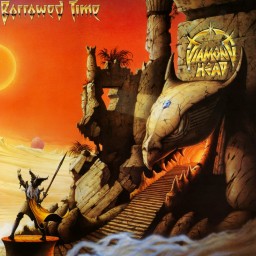
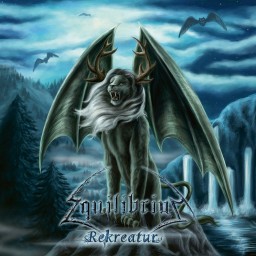
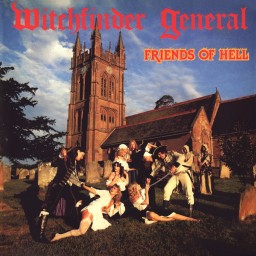
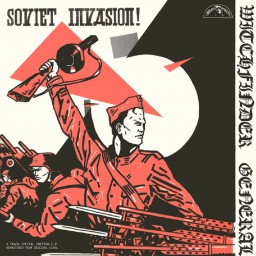
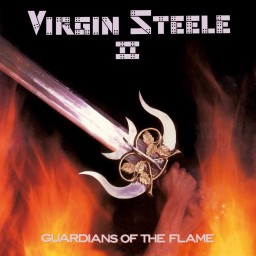
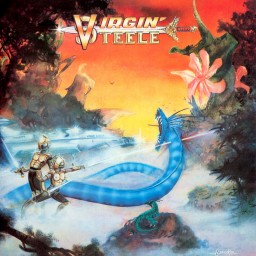
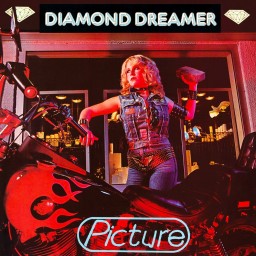
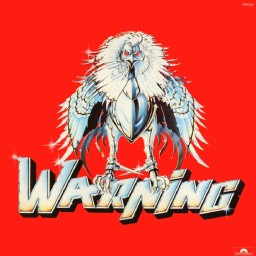
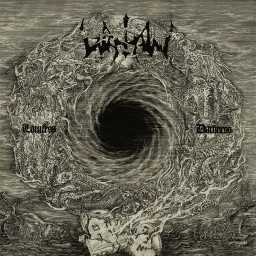
![[id]](https://metal.academy/uploads/releases/546271278b83e2f4e76db046b3c6645c.jpg)
